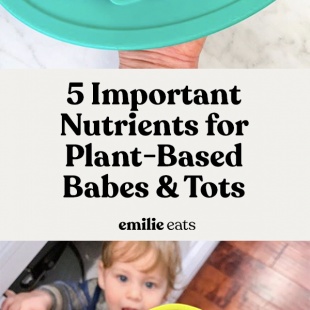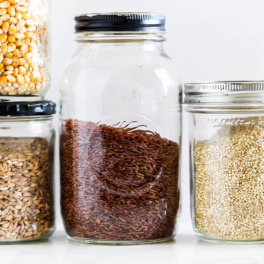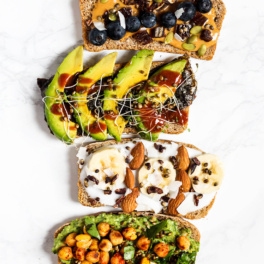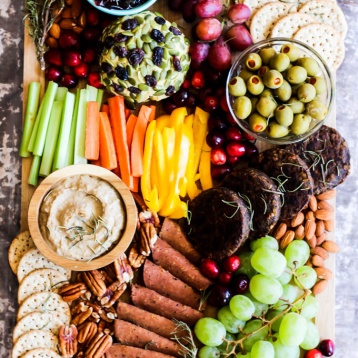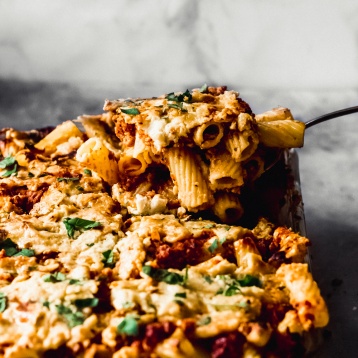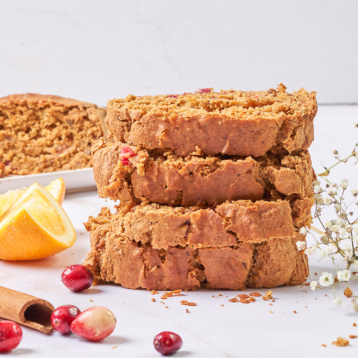While I’m traveling in Italy, I will be sharing guest posts written by a few incredible women! This post was written by Whitney English Tabaie MS, RDN and Alexandra Caspero MA, RDN, two amazing registered dietitians who created Plant-Based Juniors to guide parents in raising healthy plant-based kids. They are the authors of Plant-Based Juniors: First Bites* and The Predominantly Plant-Based Pregnancy Guide*.
Plant-based eating is becoming increasingly popular, and for good reason! Research shows plant-based dietary patterns may decrease the risk of chronic diseases like diabetes, cancer, and heart disease and increase lifespan! But are they safe for kids?
Absolutely! Anyone who tells you otherwise isn’t up to date on the research. It’s why the American Academy of Nutrition and American Pediatric Association both say that appropriately-planned vegan diets are safe for the entire lifespan, including pregnancy, breastfeeding, infancy and young kids.
As long as parents make sure their babes get enough of certain key nutrients, kids can thrive on predominantly plant-based diets. However, there are a few nutrients that are can be harder to find on a plant-based diet. We’ve got you covered, here’s exactly how to optimize them in your children’s diets.
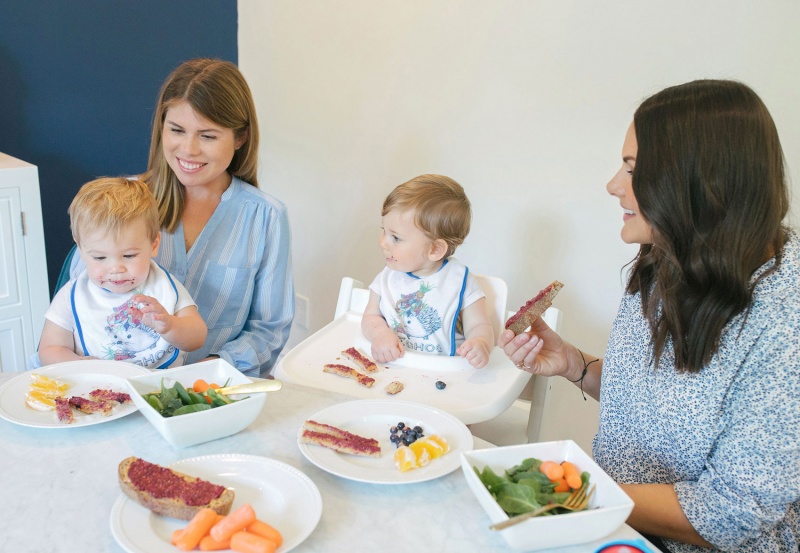
1. Iron
Iron is an extremely important nutrient for kids. It’s a main component of red blood cells, which are responsible for carrying oxygen to the cells. It’s also involved in energy production and immune function. Babies who are iron-deficient may end up with slow weight gain, pale skin, low appetite and irritability.
Infants accumulate iron in utero, but by six months, breastfed babies need to start getting it from food.
While plants have plenty of iron, the type of iron found in plants isn’t as bioavailable as that found in meat, therefore vegans and vegetarians need to eat a little more than meat-eaters. They should also aim to consume iron-rich foods with a source of vitamin C, which can boost absorption by 5-6 times!
Thankfully, many familiar foods are natural combinations of vitamin C and iron: think beans and salsa, lentil soup with tomatoes, whole grain pasta with spaghetti sauce, hummus and peppers. For our PBJs, we recommend adding a source of iron and vitamin C at most meals.
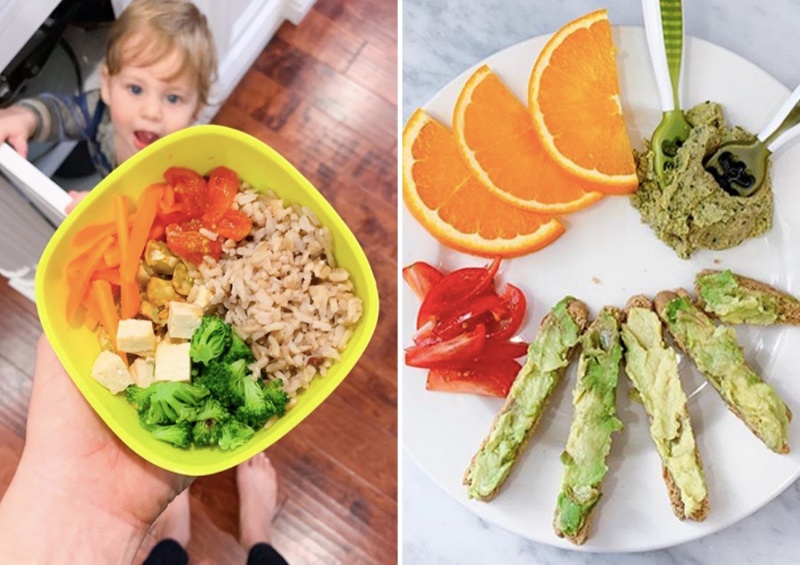
2. Vitamin B12
B12 is needed for hundreds of reactions in the body; it’s important in cell division, the formation of healthy red blood cells and needed to produce myelin, the protective sheath around nerve fibers. Considering the importance of new nerves and red blood cells for all of us, but especially during periods of rapid growth, it’s essential to have a source of B12 in your plant-based baby’s diet.
You may have read that some vegan foods, like fermented soy foods, tofu, sourdough bread and sea vegetables, contain B12 but they do not contain enough to be considered good sources, especially for pregnant and breastfeeding moms and kids.
These sources contain inactive analogues, which are similar to B12 but don’t have the vitamin activity that we need. Only animal products contain B12, therefore, breastfeeding mothers who are vegan or don’t consume enough animal foods or fortified products should supplement B12. We also recommend that strict plant-based children get their B12 from a daily supplement or multivitamin.
3. Vitamin D
Vitamin D is needed for proper bone formation, which is critical during childhood. Children with vitamin D deficiency can develop a condition known as rickets, which causes “soft bones” and skeletal deformities.
Vitamin D is only found naturally in a few foods including salmon and eggs. The good news is that you don’t need to eat anything to get vitamin D. Your skin produces it from sunlight! The bad news is that because of our increased use of sunscreen, many people (and kids) aren’t making enough of it. The AAP recommends that breastfed babies receive a supplement of 400 IU of vitamin D daily starting at birth.
Plant-based children should continue to supplement if they don’t get daily sunlight exposure and aren’t consuming adequate amounts of foods containing vitamin D.
4. Calcium
The biggest myth about plant-based nutrition for kids is that they need to drink milk to get adequate calcium. Not so! Calcium is found in all kinds of plant foods including cruciferous veggies, soy products, fortified plant milks, and legumes.
Breast milk and formula provide enough calcium for kids until 1 year of age. At one year, calcium needs triple, which is why doctors recommend children begin consuming cow’s milk at this time. If your child isn’t eating dairy however, a fortified beverage like soy milk is a nutritionally equivalent replacement as the calcium in fortified plant-based milks is just as bioavailable as the calcium found in cow’s milk.
5. Omega-3 Fatty Acids
Omega-3 fatty acids, or “long-chain” polyunsaturated fatty acids (LCPUFA), are essential to baby’s vision and cognitive development. There are two types of important omega-3s in the diet. ALA (alpha-linolenic acid), which is found in plants, and EPA/DHA (eicosapentaenoic acid/docosahexaenoic acid), which are found in marine sources like fish.
Our bodies can make EPA/DHA from ALA, but it’s an inefficient process. Therefore, parents should aim to provide plant-based kids with ample sources of ALA, found in things like walnuts and chia, flax and hemp seeds. They may also consider supplementing with algae oil, a plant-based source of EPA/DHA.

Want healthy, easy recipes incorporating these key nutrients? Check out our books Plant-Based Juniors: First Bites* and The Predominantly Plant-Based Pregnancy Guide* or follow us on Instagram @plantbasedjuniors!
Whitney English MS, RDN and Alexandra Caspero MA, RDN are the founders of Plant-Based Juniors, a community focused plant-based prenatal and pediatric nutrition.
As Registered Dietitian Nutritionists, Certified Personal Trainers and parents to PBJs, they started this community as a resource for families, like them, who want to raise their kids in a predominantly plant-based way; and feel confident about the many decisions that come with nourishing children.
Plant-Based Juniors welcomes all forms of plant-based eating, because they know that good health is not all or nothing. PBJs support parents in whatever dietary patten they feel works best for their family – whether that’s vegan, vegetarian, reducatarian or whatever. Follow them @plantbasedjuniors on Instagram and at plantbasedjuniors.com.
*affiliate links

